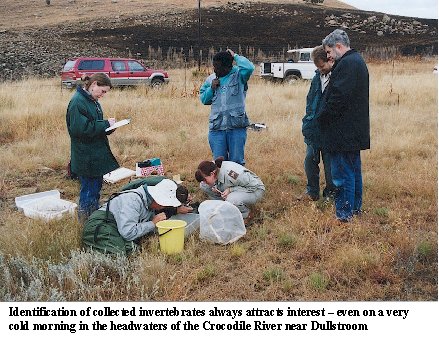
|
RHP |
South African
River Health Programme |

|
|
|
CROCODILE RIVER SURVEY, 2000The second round of monitoring of the Crocodile River system in Mpumalanga began in June this year. The Crocodile River system was first monitored in its entirety during late 1996 to early 1997. It is one of the most biologically diverse river systems in South Africa with 49 species of fish occurring within the system. A planning meeting was held in February this year in Nelspruit. Key role players from the Institute for Water Quality Studies (WQS), Mpumalanga Parks Board, Kruger National Park, CSIR as well as a representative from the Working for Water Programme discussed monitoring objectives, confirmation of existing monitoring sites and dates for monitoring trips. Membership of the core monitoring team were also agreed upon. No less than 69 monitoring sites within the Crocodile River catchment were earmarked for monitoring during 2000. Data collected will reflect upon the current status/integrity of the river system. It was also established that monitoring data could be used and integrated into the determination of an ecological reserve for the Crocodile River, which is due in the near future. Five monitoring trips were planned to allow for comprehensive monitoring of the river system, with the first trip covering the upper Crocodile catchment and the last trip monitoring the Crocodile River as it meanders through the Lowveld, forming the southern border of the Kruger National Park. The first monitoring trip took place from 19-23 June. The team was based in Lydenburg and traveled daily to the monitoring sites. Throughout the week, various interested parties joined the team, some for a day or two, others for the entire week. The objective of these interested parties was to find out what the monitoring trips entail, for example, what biological indices are used to assess what, what sampling techniques are used per biological entity being sampled and what is SASS anyway? Representatives from DWAF (Pretoria and Western Cape), Eko-tek Consultants, CSIR, IWQS and Mpumalanga Parks Board showed keen interest throughout the week. The second monitoring trip took place more recently, from 17-21 July, with the monitoring of the Kaap River, a tributary of the Crocodile River, taking place. The monitoring team was based in Barberton for the duration of the trip. Interested parties again joined the team. Representatives from DWA&F (Pretoria & Mpumalanga) as well as a consultant from KwaZulu-Natal showed keen interest. The third and fourth monitoring trips took place from 14-18 August with monitoring of the Elands River and middle section of the Crocodile River (4-8 September). The final monitoring trip is due to take place from 18-22 September. It is however uncertain at this stage whether the final trip will go ahead because of high flows in the Crocodile River which make it difficult to work in the river and also because the flow conditions may affect the results. No decision in this regard has as yet been made. To date, the trips have been enormously successful: sampling has been effectively carried out, capacity is being continually developed, and interested parties have been present and shown huge amounts of enthusiasm and interest in the project. |
 |
If your interest has been piqued by reading this article and you are keen to find out more, please contact: Ms Colleen Todd CSIR, Environmentek P O Box 395 Pretoria 0001 Tel: (012) 841-4589 Cell: 082 4962143 e-mail: ctodd@csir.co.za |